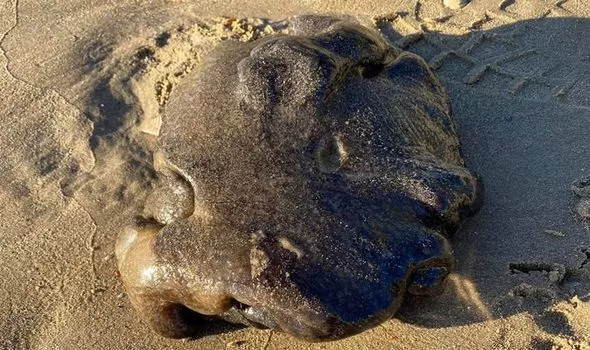Ambergris. Grey amber. Anbar. It is floating gold, once thought of as whale vomit, but now known to be a digestive excretion of a sperm whale that drifts around the oceans of the world before washing up on a beach waiting to be discovered. Despite its origins, it is sought-after, valuable, and scarce. It is so rare, in fact, that even if you go out every day looking for it, you probably won’t be lucky enough to find any. Tragically, if you have spent time walking along a beach, you may have walked past a pretty penny thinking it was a sea sponge or another flotsam not worth picking up.

Although many theories abound about the exact role ambergris plays in the whale’s digestive system, the most popular assumption involves squid. The sharp beaks of the giant squid are indigestible, so ambergris forms around the beak to protect the whale’s intestine and digestive system. Ambergris without at least one squid beak embedded is a rare find indeed.
Ambergris is a valuable commodity not only for its scarcity but also for its uncertainty of supply. Any discussion about ambergris will include folktales of heroes who have made their fortune by being lucky enough to stumble upon huge chunks of the precious stuff. Newspapers and websites worldwide report pieces selling for hundreds of thousands of dollars and even millions, but for the average beachcomber, the floating fortune remains a dream.
Ambergris can serve in a variety of applications, but the most common usage is in fine perfume as a fixative. It has also been used as an aphrodisiac and as a flavor enhancer in food and wine, specialty cakes, boutique chocolates, and high-end cocktails.
Because ambergris is challenging to identify, crooks have gleefully sold worthless blobs later exposed as dog poo, sea sponges, and the petrified remains of a yacht’s chemical toilet. Ambergris comes in many shapes, sizes and colors and the older it gets, the duller and more grey it becomes. It can be brown, black or a mixture of grey, brown and black. It is hard like a rock or dried clay.
Ambergris has a unique aroma described as a mixture of musk, sweetness, the ocean, damp forest floors, a fine cigar, and the stable floor. If you ask 20 different people who have smelled it to describe it, you will likely get 20 different answers.
Many dedicated beachcombers search for ambergris; some do it full time. For most people, it’s as easy to find as a four-leaf clover. Nonetheless, it wouldn’t hurt to keep your eyes peeled and arm yourself with a Google image next time you go for a walk along the beach.




Comments
0 comments